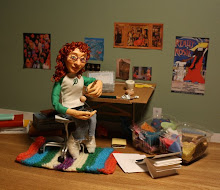The Vanishing Act by Mette Jakobsen
W.W. Norton, September 2012
This is a gem of a novel. Gorgeous imagery, philosophy, and art combine
to make a novel that may be enjoyed by adults, teens, or precocious
twelve year-olds. Minou lives on a small island, one that can be walked
around in under an hour. In addition to Minou and her lighthouse, there
is her father, a priest in the church, Boxman and his dog, No Name, in
the barn, and, before she vanished, Minou's mother. One year ago Minou's
mother disappeared. Though it is believed that she died, Minou knows
she didn't- and can rationally prove it. Her father's devotion to
philosophy and her mother's love of art and imagination combine in
Minou. When a dead boy washes up on the shore, he brings with him the
smell of oranges and questions both physical and philosophical. It will
take both her understanding of philosophy and her mother's love of art
and imagination for Minou to process the visitor.
Like Erin Morgenstern's The Night Circus, reading the The Vanishing Act is like peering into a snow globe. Though I can imagine what characters are thinking, I am removed from them, observing their strange, miniature world, my nose pressed right up against the glass. And like an intricate miniature, I want to carry this gem around, to peer into the world Mette Jakobsen has created whenever the mood strikes. The Vanishing Act doesn't disappear with the turn of the final page, but has stayed with me, alternately haunting and niggling my mind.
In the end, I wanted a little more information about the experiences Minou's parents had during the war and about where her mother might have gone. I think the postcard was a wonderful suggestion that Minou has found her philosophy, but I wanted it to (at least momentarily) enlighten her father, too. But despite these desires, I still adore the book and want a copy to carry in my pocket.
Like Erin Morgenstern's The Night Circus, reading the The Vanishing Act is like peering into a snow globe. Though I can imagine what characters are thinking, I am removed from them, observing their strange, miniature world, my nose pressed right up against the glass. And like an intricate miniature, I want to carry this gem around, to peer into the world Mette Jakobsen has created whenever the mood strikes. The Vanishing Act doesn't disappear with the turn of the final page, but has stayed with me, alternately haunting and niggling my mind.
In the end, I wanted a little more information about the experiences Minou's parents had during the war and about where her mother might have gone. I think the postcard was a wonderful suggestion that Minou has found her philosophy, but I wanted it to (at least momentarily) enlighten her father, too. But despite these desires, I still adore the book and want a copy to carry in my pocket.

No comments:
Post a Comment